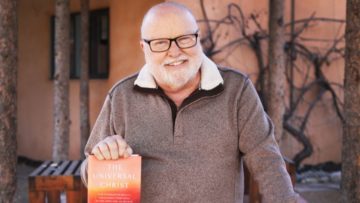by Omar Baig

Conservative and Evangelical Christians—with their provincial notions of Jesus as dying on the cross for their sins—denounce the Cosmic Christ of Father Richard Rohr as new age heresy. Yet some Christians may not even realize that Jesus and Christ are not the same. As if, he jokes, Christ was simply the last name of Jesus. By building off the Franciscan mysticism he was ordained in, Fr. Rohr defends the “alternative orthodoxy” of an eternal Christ, through which material reality fully coincides with the spiritual. Bible verses like Colossians 1:17-20 portray Christ as “before all things,” including the Jesus of Nazareth, since “in Him all things hold together.” Ephesians 1:13 affirms our “inherent union” with Christ, for “you too have been stamped with the seal of the Holy Spirit.”
Over three decades of accusations—as an apostate, false prophet, or wolf in sheep’s clothing—have compelled Fr. Rohr to ground his seemingly unorthodox and progressive theological views with extensive biblical scripture and scholarly references. Despite a formal investigation by the Vatican, Rohr remains a priest in good standing with the Catholic Church. Scrutiny only bolsters his belief that one must first know the rules well enough before knowing when they do not apply. Like the cosmos itself, the Jesus of the gospel affirms two parallel drives toward diversity and communion. Rohr’s 1999 essay, “Where The Gospel Leads Us,” for example, extends God’s unconditional love to the whole of creation: since all relationships, including LGBT ones, demand “truth, faithfulness, and striving to enter into covenants of continuing forgiveness of one another.”
Yet most will never move beyond Ken Wilbur’s first stage of spiritual development, which is preoccupied with cleaning up their own self-image as a Good Christian. They judge, put down, and exclude others for their differing practices or views as Bad Christians. Rigid purity codes generate the respectability politics of each church by policing their member’s social behavior and determining their relative standing. This parallels the ego-formation and social conformity of early childhood development, when our sense as an individual separates from our sense of others. But defining yourself by who you aren’t is what led to the extreme polarization of our current politics. Each identity group seems to define themselves more by what they think is wrong with other groups, rather than rally around their shared beliefs or goals. Read more »
